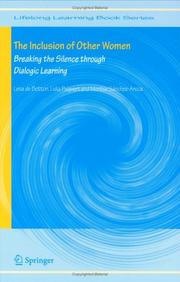| Listing 1 - 2 of 2 |
Sort by
|

ISBN: 1280284021 9786610284023 1402036817 1402035373 9048168945 9781402035371 Year: 2005 Publisher: Dordrecht, The Netherlands : Springer,
Abstract | Keywords | Export | Availability | Bookmark
 Loading...
Loading...Choose an application
- Reference Manager
- EndNote
- RefWorks (Direct export to RefWorks)
Why we are the “other women” This book recognizes a reality, our reality, that of the “other women”. Why are we the “other women”? Because we are women who, given the fact that we have not had the chance to obtain an academic education, were silenced and have remained outside of the spaces for public debate about women. This exclusion is worse if we are immigrants or belong to an ethnic minority. Those of us who are housewives, domestic workers or factory workers, because we do not have academic degrees, do not have spaces in which our voices can be heard, where we can say what we want. At times women whose voices are heard, because they have been able to go to university or have been leaders in the feminist movement, speak for all of the other women who have not been able to get a formal education, without asking us what it is we really want or think. Through our participation in educational and cultural centers and associations, many of us have formed associations and women’s groups. In this way, we are creating spaces where we can discuss issues that we are concerned about: solidarity among women, demands for better widows’ pensions, exploitation of domestic workers, etc. And we are organizing ourselves to get our voices, demands and opinions about these issues out there into the public debate.
Women --- Adult education of women. --- Feminism and education. --- Feminist theory. --- Marginality, Social. --- Education (Continuing education) --- Exclusion, Social --- Marginal peoples --- Social exclusion --- Social marginality --- Assimilation (Sociology) --- Culture conflict --- Social isolation --- Sociology --- People with social disabilities --- Feminism --- Feminist philosophy --- Feminist sociology --- Theory of feminism --- Education and feminism --- Education --- Human females --- Wimmin --- Woman --- Womon --- Womyn --- Females --- Human beings --- Femininity --- Philosophy --- Social sciences. --- Education, general. --- Sociology of Education. --- Social Sciences, general. --- Behavioral sciences --- Human sciences --- Sciences, Social --- Social science --- Social studies --- Civilization --- Adult education of women --- Feminism and education --- Feminist theory --- Marginality, Social --- #SBIB:316.346H20 --- #SBIB:316.346H23 --- Positie van de vrouw in de samenleving: algemeen --- Positie van de vrouw in de samenleving: studie en onderwijs --- Education. --- Educational sociology. --- Education and sociology --- Social problems in education --- Society and education --- Sociology, Educational --- Children --- Education, Primitive --- Education of children --- Human resource development --- Instruction --- Pedagogy --- Schooling --- Students --- Youth --- Learning and scholarship --- Mental discipline --- Schools --- Teaching --- Training --- Aims and objectives
Book

ISBN: 2735122905 2735123502 2735123669 Year: 2017 Publisher: Paris : Éditions de la Maison des sciences de l’homme,
Abstract | Keywords | Export | Availability | Bookmark
 Loading...
Loading...Choose an application
- Reference Manager
- EndNote
- RefWorks (Direct export to RefWorks)
À partir des concepts de subjectivation et de désubjectivation mobilisés par Michel Wieviorka et les sociologues de l’action, ce livre développe une réflexion sur les processus de subjectivation dans le contexte historique de la globalisation, du pluralisme culturel et identitaire, d’inégalités croissantes et de vulnérabilité. Cet ouvrage traite de ces enjeux contemporains en se basant sur l’analyse d’expériences et de débats aussi bien français qu’internationaux. Il sera ici question de violence, de l’État social, de multiculturalisme, des droits, d’émancipation ou encore de démocratie, en partant des dynamiques à travers lesquelles se construisent les acteurs. S’appuyant sur des études empiriques portant sur des objets d’une grande diversité, les auteurs analysent la capacité des individus à garder un rapport à soi et à rester acteurs malgré les tumultes sociaux, économiques, politiques et culturels parfois violents de la société globale.
Humanities, Multidisciplinary --- subjectivation --- désubjectivation --- société global --- penser global --- pluralisme culturel --- émancipation --- démocratie
| Listing 1 - 2 of 2 |
Sort by
|

 Search
Search Feedback
Feedback About UniCat
About UniCat  Help
Help News
News